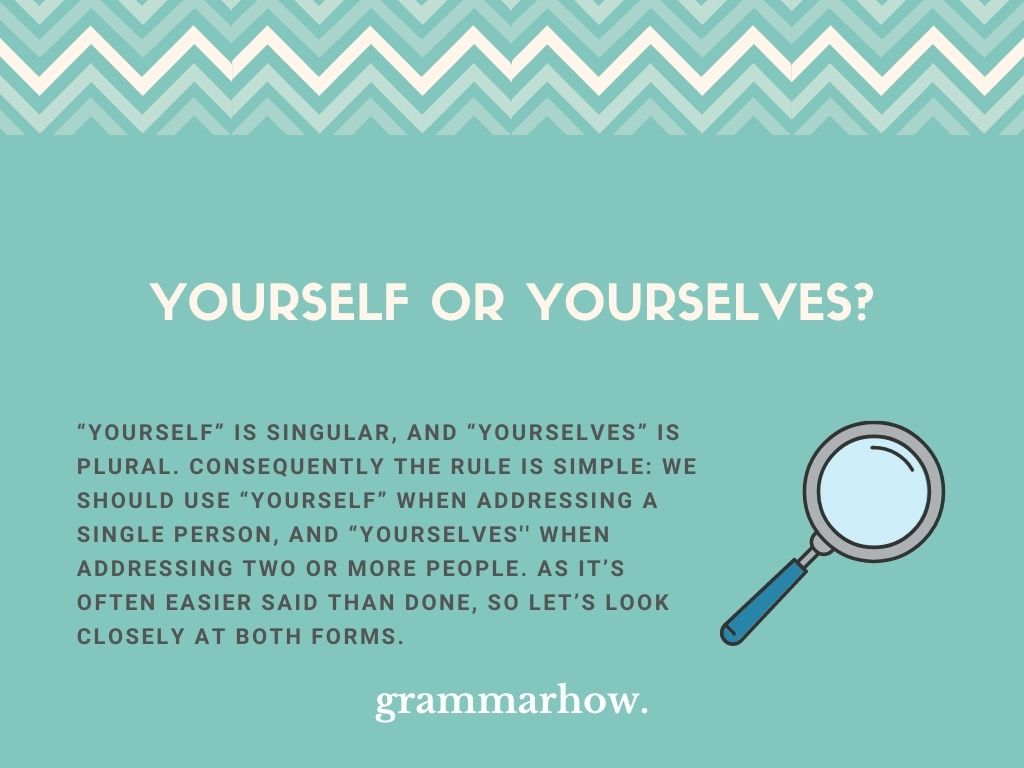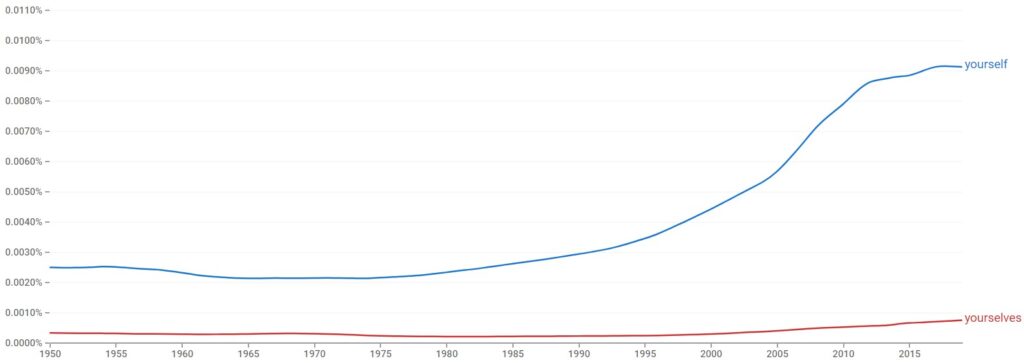To express our thoughts in the singular or plural form is often a challenge. We want to make sure we make sense, and we want to do it correctly.
“Yourself” and “Yourselves” can be tricky to use. Let’s take a closer look at them, to know when to use each.
Yourself or Yourselves?
“Yourself” is singular, and “Yourselves” is plural. Consequently the rule is simple: we should use “Yourself” when addressing a single person, and “Yourselves” when addressing two or more people. As it’s often easier said than done, so let’s look closely at both forms.

Take a look at the examples below:
- You should go watch a movie and enjoy yourself!
- You should go watch a movie and enjoy yourselves!
- Why do you want to be by yourself today?
- You’re allowed to go to the park by yourselves.
Looking at the sentences, you get a clear picture of who’s alone and who’s accompanied. And you get that idea just by the use of “Yourself” and “Yourselves”.
That’s the power those words have. If you interchange “Yourself” for “Yourselves” (or vice versa) in any of those sentences, you’ll get a different meaning every time – always pointing towards the fact that someone is alone or accompanied, whatever is the case.
When to Use “Yourself”
You should use “Yourself” when conversing with a single individual. You’re not commenting on a third person, and you’re simply saying (whatever it is you have to say) directly to this person, with no intermediaries.
“Yourself”, indicating one single person, appears in sentences as you can see by the examples below:
- Just please do it yourself, and don’t delegate the task.
- You should hear yourself talking.
- Take some time for yourself and just relax.
- Don’t try to do it by yourself, call me for help.
- Keep your smile to yourself.
Whatever “Yourself” is trying to convey, it refers to a single person, and never a group of people. “Yourself” is always addressed to only one person.
When to Use “Yourselves”
“Yourselves” should be used when addressing two or more people, and the message you’re sending is valid for all of them at once. “Yourselves” would never relate to a single person.
“Yourselves”, indicating more than person, appears in sentences as you can see by the examples below:
- Why can’t you just focus, and finish it yourselves?
- You shouldn’t be putting yourselves at risk like this.
- In class, you need to be doing the work yourselves, not copying off of each other.
- Did you enjoy yourselves during your vacation?
- Please defend yourselves, and always speak up.
The presence of “Yourselves” indicates that the message is addressed to a group. “Do it yourselves”, means everyone should do it. “Enjoy yourselves” means to have fun as a group.
In every sentence, “Yourselves” brings the idea of collective.
Which Is Used the Most?
When talking to each other, do people usually mention just one person, or a group of people? Is it more common to say “Yourself” or “Yourselves”? We’ll find out by looking at the graph from Google Ngram Viewer below.

The graph shows that “Yourself” is used with much more frequency than “Yourselves”.
Perhaps the reason is that there are many ways to refer to a group that doesn’t necessarily involve using the word “Yourselves”.
For example, instead of “do it yourselves”, a teacher may say something like “do it as a group” or “work in pairs” and basically convey the same message. However, the word “Yourself” as a reflexive pronoun is harder to replace.
Is Yourselves Plural for Yourself?
“Yourselves” is plural for “Yourself”. Although “Yourselves”, out of the context of a sentence, doesn’t define any particular number of people, it works as a plural for “Yourself”. If you want to decide to use “Yourself” or “Yourselves” based on the concept of singular and plural, you can do it.
Take a look at the example below:
- Look after yourself, will you?
- Look after yourselves, will you?
A small change in the sentences, which is changing “Yourself” (singular) for “Yourselves” (plural) indicates the presence of at least a second person.
“Look after yourselves” could indicate two people, as much as it could indicate ten. We’d need more information to understand how many people are included in the advice. But the fact that “Yourselves” addresses a plural audience, is undeniable.

Martin holds a Master’s degree in Finance and International Business. He has six years of experience in professional communication with clients, executives, and colleagues. Furthermore, he has teaching experience from Aarhus University. Martin has been featured as an expert in communication and teaching on Forbes and Shopify. Read more about Martin here.
